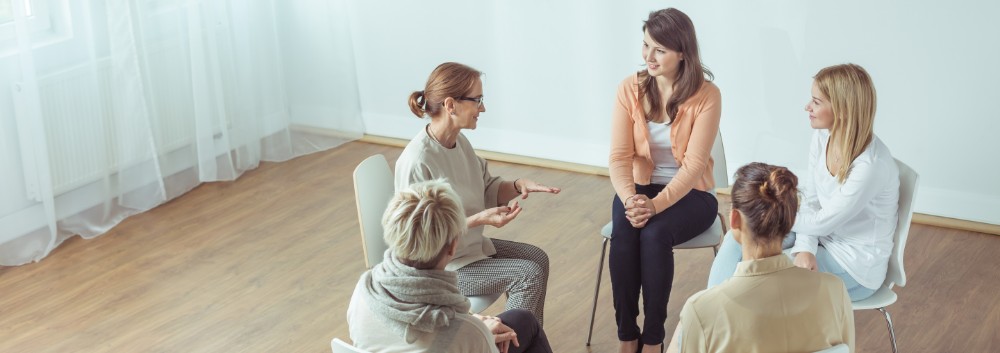
The recovery process can a difficult and taxing one, to say the least, wherever we are on our journey, whether just beginning to think about getting clean or already well into our sobriety. One of the tendencies that can hold us back the most is that of shutting down, closing ourselves off, and refusing to be open, both with ourselves and with other people. Being resistant to openness and healing makes the work we’re doing that much harder. We can feel like we’re fighting an uphill battle we can’t win because by not being open, we’re actually working against ourselves. When we’re not open, we’re not being honest with ourselves. We’re not giving ourselves the gifts of self-reflection, strength, and clarity. We’re trying so hard to keep up with pretenses – that we’re fine and that we’re not suffering as much as we really are, that we don’t need help, that our pain is not threatening to derail us. When we’re not open, we’re disconnected from our inner selves. We’re hiding things, burying and suppressing them, lest we are forced to face them head-on and find ourselves overwhelmed with all the difficult thoughts and emotions they bring with them. We’re blocking out memories, forgetting traumatic experiences and entire periods of our lives. We’re keeping ourselves from accessing our very important truths. We’re isolating ourselves from other people, distancing ourselves from important relationships and cutting people out of our lives. Openness is the remedy to the deep disconnection we feel, the loneliness that can be such a huge factor in our illness, the fears that keep us unwell. When we are open, we empower ourselves to heal.
We’re afraid of being open with both ourselves and other people because we fear the vulnerability that comes with exposing our truth. We haven’t yet developed the fearlessness that enables us to speak our minds and be comfortable in our own skin. We haven’t become so unconditionally self-loving and self-accepting that we can be confident in the face of our weaknesses and challenges. We’re still afraid that being open means we’ll be judged, criticized, looked down upon and ridiculed. We still fear being rejected and excluded by the people who are important to us, shunned and ostracized by society, pushed out by our families and communities. At the heart of our fear is often a traumatic experience that first brought up these feelings for us, that makes us want to hide who we really are. The foundation of our fears is also often a deep and pervasive sense of unworthiness, a lack of self-love, and feelings of inadequacy. When we feel strong within ourselves, believe we are in fact good enough, our perceived weaknesses and any imperfections we might think we have aren’t moral failings, they are a crucial part of our growth and evolution. When we’re able to accept them openly, we stand to learn valuable lessons and to gain important insight into ourselves. Our mistakes, our wounds, and our shortcomings show us where we still need healing, where we are still punishing ourselves with self-hate instead of nurturing our growth with love.
Choosing openness as part of our recovery means making the conscious choice not to let any aspect of ourselves make us feel ashamed of who we are, or that we’re not good enough, not strong enough, or not capable enough of making changes in our lives. We tend to think we’re not far enough along in our recovery, that we’re not working hard enough, that we’re not where we should be at this point in our lives. We compare ourselves to other people, viewing their journeys as better than ours. These thought patterns cause us to want to shut down completely. We hate ourselves and are filled with insecurity, envy, and competitiveness. We want to shift the mental and emotional associations we have with ourselves from feelings of inadequacy and inferiority, that make us want to close ourselves off from other people to feelings of self-assuredness and confidence, that make us want to connect. We want to try to see, as much as possible, how connected we in fact are, how many similarities and commonalities we share, how much we’re all struggling with the same elements of human nature and of recovery. We want to view ourselves with compassion, not condemnation. We want to be patient with ourselves as we’re healing our deep wounds, not be frustrated with our perceived lack of progress. Wherever we are along our journey is where we are meant to be. We want to encourage ourselves to be open and honest with ourselves and to do that we must learn how to be self-accepting.
When we are open, we allow our intuition, our energy and our insight to flow. We’re no longer blocked by our fears of judgment and rejection, inadequacy, inferiority, and unworthiness. The lessons we’re meant to learn have the necessary space to take root within us. Breakthroughs, revelations, and epiphanies can come to us. We can approach our self-discovery with courage rather than resistance. We can take the things we want to change about ourselves and stop viewing them as evidence of inadequacy but instead as catalysts for self-improvement and personal development. We can love ourselves and begin to view even our difficult experiences and challenging attributes as beautiful parts of our healing journey. Openness allows love, light, and healing to flow to us and within us.
At The Guest House Ocala, our recovery programs include many experiential modalities including traditional therapy, conscious connected breathwork, equine therapy, somatic experiencing, art in healing, grief therapy, mindfulness and other forms of therapy. Contact us today at 855-483-7800 for more information on how we can assist you in your recovery.